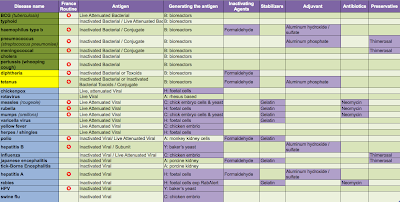The current vaccine market is dominated by Big Pharma (see my post). However, the dynamic development in vaccine R&D could change this landscape in the near future. The following table provides an overview of the potential challengers to the current market leaders, in six main categories of vaccines:
 |
| Overview of Global R&D pipeline |
Pediatric vaccines account for more than 40% of all disclosed vaccine R&D, and for the majority of all vaccine projects conducted by manufacturers in emerging countries. Such attention is caused by both the market size of this category, which according to the projections will reach $100Bln globally by 2025, and by the aggressive vaccination efforts of GAVI alliance, who drives demand and buys more than 50% of pediatric vaccines worldwide. GAVI global vaccination targets gives a guaranteed long-term demand with a preference for developing countries' manufacturers and new vaccines. This leads to a situation in which main developing countries manufacturers are trying to enter the main pediatric disease areas, and existing Big Pharma tries to maintain its market share by proposing improved vaccines in the same disease categories. Competition is even fiercer with the new "technology transfer" initiative from Big Pharma to developing countries.
Three UN Millennium Goal diseases - HIV, Malaria and Tuberculosis - remain scientific challenges with promises of glory and wealth. They attract both Big Pharma, small start-ups and research institutions from all countries. With most of the projects in these areas still in the proof-of-concept stage, we are seeing more and more players progressing to more advanced stages, with even one HIV project at Phase III from Finnish FIT Biotechnologies.
With the growth of purchasing power in Asian and Latin American countries, more companies are turning their heads towards tropical diseases. It is particularly exciting to see progress for diseases with no current vaccines at all. For instance, Sanofi is expecting to launch the first ever Dengue fever vaccine, and Crucell is aiming at the Ebola virus.
The market success of HPV, although mostly driven by cancer concerns, has probably contributed to the explosion of interest in the area of sexually transmitted diseases (STD), with Genoceas aiming to become a pioneer in chlamydia and herpes simplex vaccines.
Finally, it is interesting to observe the R&D effort coming from emerging countries: Chinese companies (Chengdu Institute, 3SBion, Sinovac) and Indian companies (Serum Institute and Bharat) are focusing on replacing Big Pharma vaccines in their local markets. And Instituto Finlay from Cuba wants to break-through in the most scientifically challenging areas (malaria, tuberculosis, hepatitis), while Brazilian, Indonesian and Mexican players prefer to rely on technology transfer programmes.
ps: the table above does not mention therapeutical cancer and influenza vaccines because there are an important and particular areas which should be treated separately.
ps: the table above does not mention therapeutical cancer and influenza vaccines because there are an important and particular areas which should be treated separately.
